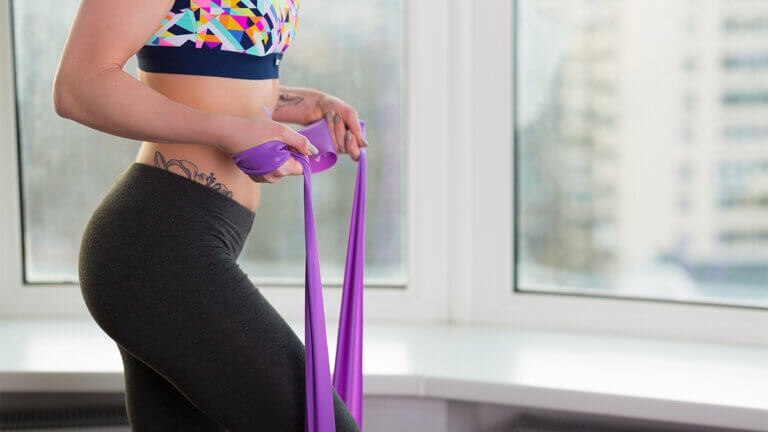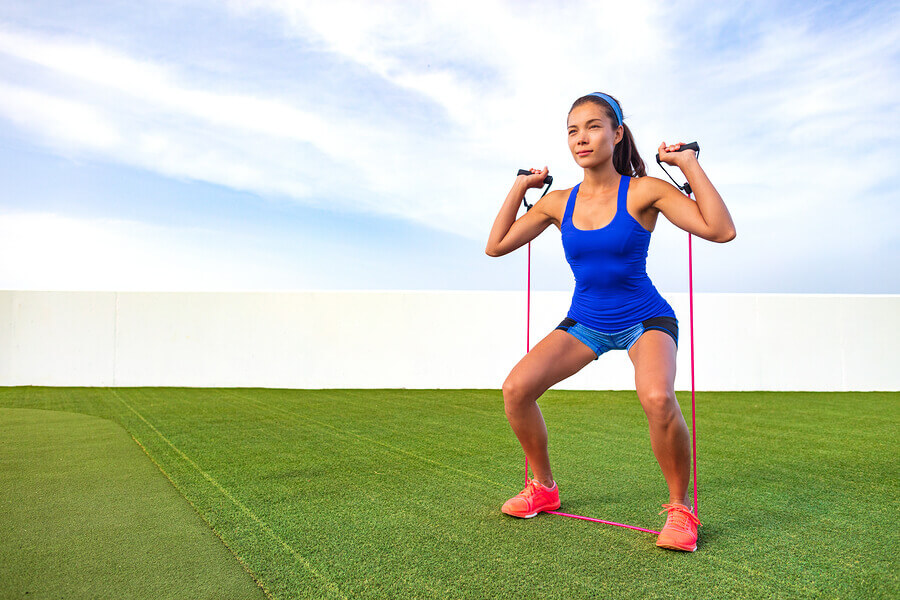What are Pumping Exercises?

If you’re in the process of increasing your muscle mass, you’ve probably already practiced a few pumping exercises? If you still don’t know about them, read along to find out what they consist of. In addition, we’ll also share a few examples that you’ll be able to incorporate into your training routine.
In the following article, we’ll also explain the proper technique to perform pumping exercises. Proper execution is key to avoiding injuries and achieving results.
What is pumping?
Pumping exercises vary, they’re carried out to work the whole body, tone and increase muscle mass. When these exercises are performed, blood is pumped and distributed throughout the body. As a result, body temperature rises and metabolism accelerates.
Here are a few outstanding characteristics of pumping:
- Repetitions should be carried out with light weights and long series that make the muscles work until the point of exhaustion.
- Exercises are carried out slowly with the greatest amplitude possible. It’s important to perform the exercises slowly. This is the only way to make sure that blood is pumped effectively throughout the body.
Are pumping exercises effective?
The answer to this question is a resounding ‘yes’. If you’ve done them for a long time and haven’t gotten results, it’s probably because you are not performing the exercises correctly.
For example, short series and executing the exercise too quickly are two of the most frequent mistakes. Both factors negatively affect results.

The effectiveness of pumping exercises is due to the characteristics of the routine. Most workouts only work with the most important muscle fibers. On the other hand, pumping exercises include performing repetitions until the muscle is exhausted. This in effect, works out all of the muscle fibers.
As we previously stated, when done correctly, pumping exercises can tone and increase muscle mass. In addition, these exercises accelerate metabolism and therefore, help accelerate fat loss. Another positive aspect is that pumping exercises help to prevent injuries since they strengthen muscle fibers.
Examples of exercises
The best way to learn about an exercise is through examples. These examples will give you a clear idea about this practice. With the supervision of a professional and the proper technique, you’ll be able to include pumping exercises into your routine.
- Rowing: to perform this exercise, all you need is an elastic band and a place to anchor it. Then, kneel on the floor, it’s important to support one knee while keeping the other upright. Slowly stretch the bands until they reach the height of your face and repeat the exercise at least 80 times. Afterwards, you can rest, but it’s important to perform as many repetitions as possible before you do. This exercise is similar to the one illustrated in the image.

- Shoulder curls: This exercise is also performed with elastic bands. It’s a great way to workout the shoulders. First, step on the bands with both feet which should be placed at the width of your hips. Slowly stretch the rubber bands to the height of your shoulders.

Risks of pumping exercises
All exercises have certain risks. This doesn’t mean that they are dangerous, however, they may be if performed inappropriately. As a result, not only will not you achieve your desired goals, there will also be a greater likelihood of injury.
The most common mistakes that increase the risk of injuries while performing pumping exercises are the following:
Exercising too fast
The first thing you have to know before performing these exercises is that it’s not a speed routine. Take your time to perform the exercises and pay attention to your technique.
We always say that rushing is never a good idea, this is especially true when muscle fibers are completely exhausted. When this occurs, injuries are more likely. It’s also important to respect rest and recovery days.
Not using the correct technique
As you have seen, most pumping exercises are simple. The only difficulty is the number of repetitions that should be performed.

Pumping exercises that are done incorrectly can bring along negative consequences. Incorrect techniques can lead to injuries.
In conclusion, pumping exercises are effective and very variable. There are many different options you can try. Include them in your routine and experience the excellent results!
If you’re in the process of increasing your muscle mass, you’ve probably already practiced a few pumping exercises? If you still don’t know about them, read along to find out what they consist of. In addition, we’ll also share a few examples that you’ll be able to incorporate into your training routine.
In the following article, we’ll also explain the proper technique to perform pumping exercises. Proper execution is key to avoiding injuries and achieving results.
What is pumping?
Pumping exercises vary, they’re carried out to work the whole body, tone and increase muscle mass. When these exercises are performed, blood is pumped and distributed throughout the body. As a result, body temperature rises and metabolism accelerates.
Here are a few outstanding characteristics of pumping:
- Repetitions should be carried out with light weights and long series that make the muscles work until the point of exhaustion.
- Exercises are carried out slowly with the greatest amplitude possible. It’s important to perform the exercises slowly. This is the only way to make sure that blood is pumped effectively throughout the body.
Are pumping exercises effective?
The answer to this question is a resounding ‘yes’. If you’ve done them for a long time and haven’t gotten results, it’s probably because you are not performing the exercises correctly.
For example, short series and executing the exercise too quickly are two of the most frequent mistakes. Both factors negatively affect results.

The effectiveness of pumping exercises is due to the characteristics of the routine. Most workouts only work with the most important muscle fibers. On the other hand, pumping exercises include performing repetitions until the muscle is exhausted. This in effect, works out all of the muscle fibers.
As we previously stated, when done correctly, pumping exercises can tone and increase muscle mass. In addition, these exercises accelerate metabolism and therefore, help accelerate fat loss. Another positive aspect is that pumping exercises help to prevent injuries since they strengthen muscle fibers.
Examples of exercises
The best way to learn about an exercise is through examples. These examples will give you a clear idea about this practice. With the supervision of a professional and the proper technique, you’ll be able to include pumping exercises into your routine.
- Rowing: to perform this exercise, all you need is an elastic band and a place to anchor it. Then, kneel on the floor, it’s important to support one knee while keeping the other upright. Slowly stretch the bands until they reach the height of your face and repeat the exercise at least 80 times. Afterwards, you can rest, but it’s important to perform as many repetitions as possible before you do. This exercise is similar to the one illustrated in the image.

- Shoulder curls: This exercise is also performed with elastic bands. It’s a great way to workout the shoulders. First, step on the bands with both feet which should be placed at the width of your hips. Slowly stretch the rubber bands to the height of your shoulders.

Risks of pumping exercises
All exercises have certain risks. This doesn’t mean that they are dangerous, however, they may be if performed inappropriately. As a result, not only will not you achieve your desired goals, there will also be a greater likelihood of injury.
The most common mistakes that increase the risk of injuries while performing pumping exercises are the following:
Exercising too fast
The first thing you have to know before performing these exercises is that it’s not a speed routine. Take your time to perform the exercises and pay attention to your technique.
We always say that rushing is never a good idea, this is especially true when muscle fibers are completely exhausted. When this occurs, injuries are more likely. It’s also important to respect rest and recovery days.
Not using the correct technique
As you have seen, most pumping exercises are simple. The only difficulty is the number of repetitions that should be performed.

Pumping exercises that are done incorrectly can bring along negative consequences. Incorrect techniques can lead to injuries.
In conclusion, pumping exercises are effective and very variable. There are many different options you can try. Include them in your routine and experience the excellent results!
All cited sources were thoroughly reviewed by our team to ensure their quality, reliability, currency, and validity. The bibliography of this article was considered reliable and of academic or scientific accuracy.
- Lison Parraga, J. F., & Sarti Martínez, M. A. (1998). Velocidad y rango de movimiento en el fortalecimiento de músculos posturales. Estudio preliminar. Archivos de Medicina Del Deporte.
This text is provided for informational purposes only and does not replace consultation with a professional. If in doubt, consult your specialist.








